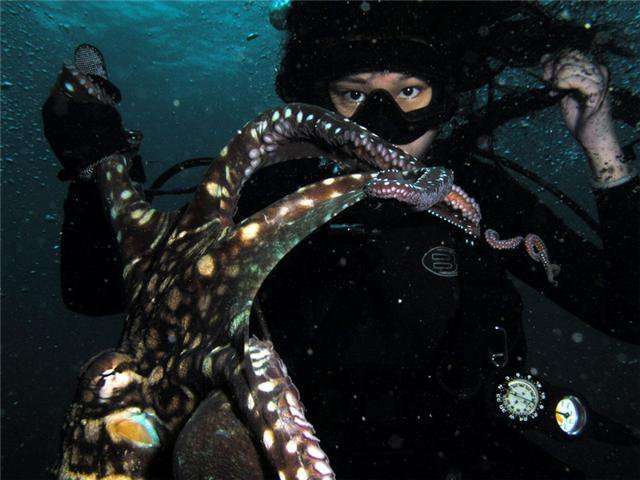***

"Dancing with the octopus at Anilao"
Last week, some people were expressing disgust that Nikon Asia had endorsed this picture as a "truly astounding shot" (the photo has since been taken down):

While one may dispute the photographic merits of this shot, most people were more concerned about animal rights and one even claimed that he would report it to the WWF.
This begs a very important question:
"Why is it alright to eat animals, but not to have sex with them?"
Or a more contextualised one:
"Why is it alright to eat animals, but not to manipulate them for photographs?"
The first question more incisively cuts to the centre of what seems to me to be one of the two most problematic aspects of most people's stances on animal rights (the other being "Cute animals are just as delicious as ugly ones").
The instinctual response to this question, "that's disgusting", just avoids the question, which is an important one for practical ethics, given the widespread nature of meat-eating in the world today.
Most of us are perfectly fine with eating animals, and yet react so violently when witnessing or viewing examples of alleged animal "cruelty". Besides the octopus example earlier, we also have:

Keeping Whale Sharks in Aquariums

Mink Farms

Seal Clubbing

Circus Animals

Bonsai Kitten
Yet, both the suffering that animals undergo while being raised and when being slaughtered, as well as the fact that we deprive them of their lives individually would outrank most examples of "animal cruelty" in the Rankings of Sin.
"Slaughterhouse Murder"
Together, they would surely surpass all of the examples. To wit, if you were tortured you would be pissed off; if you were killed painlessly you would be upset; if you were tortured and then killed you would be furious.
"Cow slaughter in USA"
That many of the people against relatively innocuous uses for animals (like taking photos) are not vegetarian is thus extremely puzzling.
This brings to mind how in secondary school I was accused of being "cruel" for stepping on millipedes - by the very same people who then manipulated other animals for their amusement (for example, by intoxicating mealworms with alcohol).
Back to the issue of bestiality, we can ask ourselves a simple question: would you rather be killed and eaten, or raped?
This question might be anthropocentric (animals might not have the same preferences as us), and prematurely preclude the possibility of animals consenting to sex with humans (some sources testify to this, including this "Delphinic Zoophile", who testifies that "her body also shuddered against mine, and we spent the next 5 or so minutes just lying together in the shallows, holding each other, enjoying our company and revelling in the fact that we had shared something special together, something very few people can claim to have done") as well ignore the fact that inter-species sex is prevalent in nature, but it is the best way to grasp this problem.
Besides a quick moment of personal reflection, the fact that most people who have been raped do not then kill themselves also answers this question. Knowing some people who have been raped I can also confirm that.
Essentially, then, the confused attitudes people hold with regard to eating and having sex with animals boil down to an argument from disgust. This is the same reason why the same people who call homophobes bigots are happy to condemn incest, polyamory and other consensual practices between informed adults that they do not approve of.
Extending this to other forms of "animal abuse", it is clear that it is not genuine animal suffering that motivates people to protest, but the fact that breeding, slaughtering and then eating animals have been normalised and are deemed acceptable, with disgust (or a form of disgust) motivating the grossly disproportionate response to relatively trivial forms of animal suffering.
As an aside, we can resolve the contradiction identified in this post and still be against unnecessary cruelty to animals. For example, we can be against the killing of animals by slitting their throat and letting them bleed to death, as opposed to stunning them first so they don't feel any pain, since the extra pain suffered by the animals does not result in corresponding utility on the part of humans.
Of course there're other cases which would make one uncomfortable.
For example, if a person is sadistic and enjoys torturing animals, we would seem to be committed to allowing him to continue (even if we didn't endorse his action).
I could fudge the issue and claim that it's unlikely that a person can get so much pleasure from torturing an animal that it could outweigh the suffering of the animal, but since it is not unimaginable that people can get as much pleasure from torturing an animal as eating it, the question would then be whether there is a magnitude of difference in the animal's suffering from its being killed for meat versus its being tortured, but then this is a technical question, rather than one of principle.